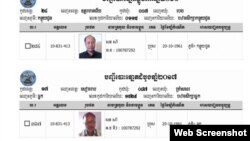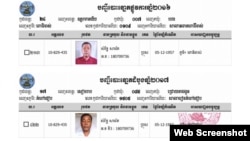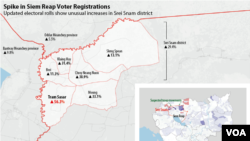Three high-ranking Royal Cambodian Armed Forces (RCAF) commanders stationed along the country’s northwestern border switched their voter registration to the more tightly contested Siem Reap province ahead of the July 29 election, according to electoral data obtained by VOA Khmer.
The commanders, who lead Intervention Brigades 4, 5, and 6, were previously registered to vote near their respective headquarters in the sparsely populated province of Oddar Meanchey, which is dominated by the military and has only one parliamentary seat.
A VOA Khmer investigation in April found evidence of large-scale troop movements in late 2017 from the highly militarized provinces of Oddar Meanchey and Preah Vihear to Siem Reap so that soldiers could register in the latter province, where support for the ruling Cambodian People’s Party (CPP) has declined over the past few years.
Nearly 6,000 people from Oddar Meanchey and Preah Vihear registered to vote in Siem Reap for the first time in the 2018 election. Almost 90% of them were men, and many registered at newly-created polling stations. However, this is the first evidence that high-level military officials have also switched their registration for what may be political purposes.
Major General San Sea, the commander of Intervention Brigade 4, was registered in Oddar Meanchey, where he is based, in 2017. But by 2018 his voter registration had switched to Tram Sarsar commune of Siem Reap province, the commune with one of the largest increases in voters nationwide. Major General Sea is now registered to vote at a polling station with 73.6% men.
Major General Samrith Saret, the commander of Intervention Brigade 5, has moved his registration from near his brigade’s headquarters to Siem Reap’s Chrouy Neang Nguon commune, to a polling station with 83.1% men that was newly created before 2018.
And Major General Chhum Kheng, the commander of Intervention Brigade 6, switched from his brigade’s headquarters to Kantuot commune in Siem Reap, to a newly-created polling station that is 74.4% men.
Asked why he had moved from Oddar Meanchey to Siem Reap, General Saret asked, “Who told you that?”
When told the information came from official National Election Committee records, he claimed that his brigade was actually based in Siem Reap and that the previous registration was the anomaly.
“I’ve been based in Sreysnam [district] for a long time already, but in the commune election, I went to vote in Oddar Meanchey province. It is easy to vote in Siem Reap.”
He denied having switched registration at the behest of the ruling party.
However, an examination of a satellite map shows a large RCAF base in Beng commune, Oddar Meanchey, very close to the polling station in Pou Chas village where General Sareth was registered in 2017. There is no known base in Sreysnam district large enough for a brigade, which has thousands of soldiers.
General Kheng declined to comment on the matter. General Sea could not be reached for comment.
All three generals were added to the CPP’s Central Committee during a party congress in February 2015 that saw a notable influx of members of the security forces onto the body.
Human Rights Watch said at the time that the congress marked a concerning increase in the partisan affiliation of military and police figures with significant command authority.
Major military figures connected to Prime Minister Hun Sen, including his sons Hun Manet and Hun Manith and the commander of his personal bodyguard unit, were also added to the committee that day.
Defense Minister Tea Banh, himself a high-ranking member of the CPP who sits on the party’s powerful Standing Committee, is both a four-star army general with authority over troop movements and the CPP’s electoral coordinator for Siem Reap province.
Phil Robertson, the deputy Asia director for Human Rights Watch, told VOA Khmer that troop movements for electoral purposes were a predictable consequence of the increasing partisan identification of the military.
“Shifting the registration of military voters to win communes where support for the CPP is flagging shows just how far Cambodia has fallen from the principle of political neutrality of the security forces that is enshrined in the law,” he said.
Robertson added that moving soldiers and commanders into villages for the election also promoted fear among the general population.
“Villagers seeing these military voters come into their constituency are fearful of publicly proclaiming support for other political parties, especially the banned CNRP,” he said.












